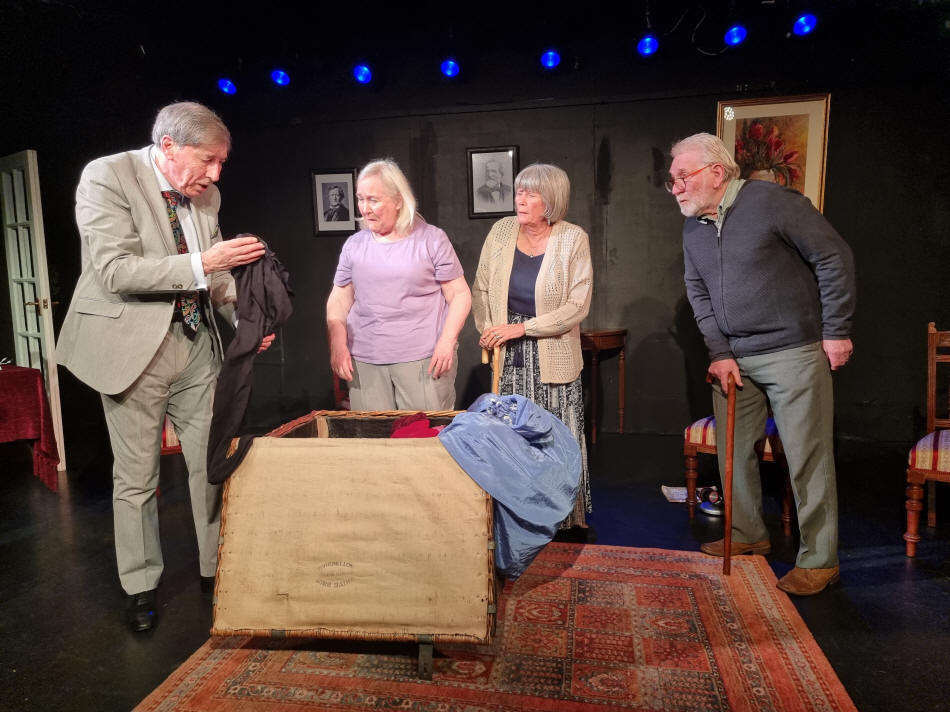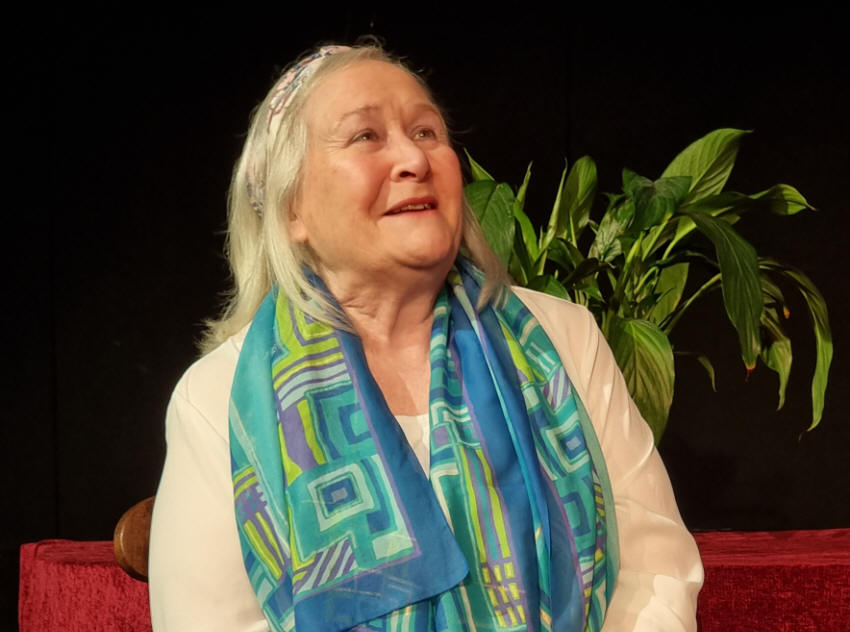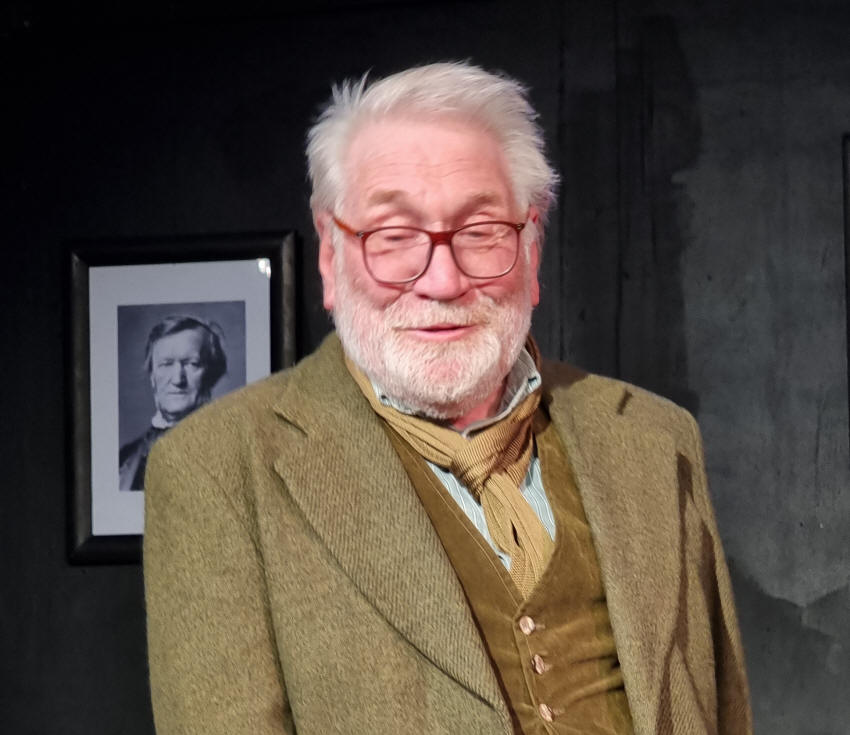
Nigel Hales as Reggie, Sue Hawkins as Cissy, Sue
Smith as Jean and Martin Bourne as Wilf. Pictures: Poppy Savage
Quartet
Swan Theatre Amateur Company
Swan Theatre, Worcester
****
Old age is something we are grateful to
reach, the alternative being somewhat less appealing, yet it is
something we hate when we get there – the ultimate and final love hate
relationship.
And, in essence, that is what Ronald Harwood’s
play is about, that twilight world between Shakespeare’s sixth and
seventh ages of man.
The title representing a rather care worn double
edged sword in this case, the quartet being both Bella figlia
dell'amore from the third act of Verdi’s Rigoletto, and
the now, should we say . . . more mature . . . foursome of opera singers
who had long ago performed a renowned version of Verdi’s opera which had
just been re-released on CD.
The singers in question being residents, or
inmates as they prefer to call it, in a retirement home for operatic
singers and musicians.
We open with three friends who sang together and
have known each other for years, all ending up in the same home.
There is Reggie, steady serious, tenor, at least
once upon a time, Reggie. He is thoughtful, if rather dull in the steady
hands of Nigel Hales. He is reading one of Ernest Newman’s studious
tomes about Wagner, the sort of book you suspect is usually bought to
impress rather than, God forbid, be actually read.
Then there is Wilf played with a constant sparkle
of fun, twinkling eyes and lust for the ladies by Martin Bourne. Once
upon a time baritone Wilf, who was once compared to the legendary Tito
Gobbi, can see sex in almost - no forget almost, he can see sex in
any situation with Cissy being the current object of his lustful
desires.
Contralto Cecily spends her days listening to
Rigoletto and her part in it on CD on her Walkman (younger readers ask
Grandad).
She is drifting serenely into dementia, that
seventh age of man and Sue Hawkins manages that fine balance between
potential panto and genuine empathy quite beautifully.

Cissy struggles to remember even the most recent
things, and her colonial childhood with parents in India is invading and
challenging her present. Sue plays the part gently and compassionately
for its many laughs but behind it all we, and Reg and Wilf, can see she
is slowly drifting away from our world and they are holding her back as
hard as they can.
The trio are discussing the annual highlight at
the home, the October 10 gala performance to celebrate the birth of
Giuseppe Verdi in 1813, when all the residents were expected to do a
turn.
With our trio relative newcomers, all arriving
during the past year, this would be their first gala and a break in . .
. well as Wilf tells us “time doesn't move slowly in here. It hobbles
along with a zimmer frame."
Reg had been asked to reprise his celebrated
La donna è mobile from yesteryear, Cissy was trying to remember
what was said at the committee meeting she had just attended and Wilf
was, as usual, thinking about sex when their already shrinking world was
turned upside down by the arrival of a new resident, superstar (once
upon a time) soprano Jean Horton, played with a prima donna air, even if
a little creased and decrepit now, by Sue Smith.
We discover Reg and Jean had once been . . . it
was a short lived and somewhat disastrous marriage. Jean had gone on to
change husbands as often as others change cars, while Reg had . . . gone
on, it being the only thing to do.

He had lived a frugal life, saving hard to pay
for his keep in the home, proud he was not a charity case, like the
rest, one of his life’s small victories after the lasting trauma of his
marriage, a marriage that still haunted him.
And here we were, Reg and Jean together again, by
circumstance rather than choice. Reg’s choice being to never see Jean or
hear her name again.
With the famed quartet back together, or at least
in the same place, singing the other famed quartet becomes, let’s just
say, it would be possible.
The reunion of sorts leads to some soul
searching, and some telling and well delivered speeches about age and
art and music, and even humanity and humility, from Reggie.
We have laughs a plenty but there are also
moments of sadness as our quartet drop the defences and open up. There
are Jean’s regrets and her final fall from grace, Wilf’s unfounded
reputation and despair at the ravages of age and his refusal to go
gently into that good night, Cissy and her strange and troubled
childhood and need to be loved and Reg, loner Reg and the secret that
had if not blighted, had at least set the course of his life.
Then there is their lost youth, it had been years
since they had last sung, did any of them still have a decent voice, or
indeed, any voice at all? Would they just end up destroying the legacy
they had created so many years ago?
Which all leads up to the gala and the quartet’s
quartet . . . which you will have to see and hear for yourself.
This is a play about age and growing old, it is
awash with laughs and good humour, and tales of worn out hips, aches,
pains and struggling memories only those of a certain age can fully
appreciate – and will probably have forgotten about come morning.
We even hear of five minute breaks after each
item in the gala concert, “Why?” asks Jean, “Bladders” she is told.
Yet there are moments that are touching, sad
even, and, even if we don’t want to think about it, it reminds us of
mortality, something we all carry with us . . . at least while we are
here.
If there is a fault it is perhaps that the play
just stops rather than actually ending. The gala performance is the
finale, yet it leaves our quartet in limbo, we never do know what
happens to them, we are left to fill in their stories, happy or sad,
ourselves.
The studio set is simple and effective and the
Rigoletto costumes in the final act add to the gala feel, with Frank
Welbourne, off stage, as the voice of gay resident Bobby Swanson, giving
us an awkward heckler for Wilf to deal with.
Director Jane Lush keeps things moving along at a
gentle pace befitting our operatic seniors, and, mercifully, for those
who know the play, ends, quite literally, on a high note. The result is
a gentle comedy with laughs and heart, and a bit of Verdi thrown in for
good measure. To 30-03-24.
Roger Clarke
27-03-24
|

